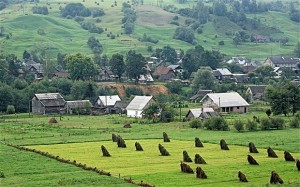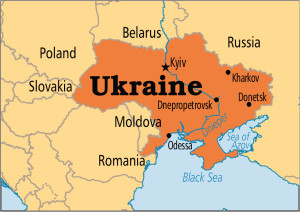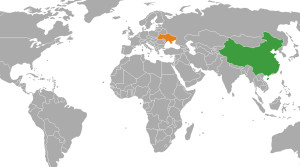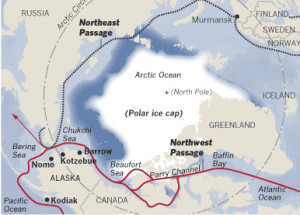News from Ukraine, Canada and India
Tuesday's World Events — Posted on October 1, 2013
UKRAINE – China ‘to rent five per cent of Ukraine’

Ukraine is rich in arable land (Photo: ALAMY)
Ukraine has agreed to a deal with a Chinese firm to lease 5% of its land to feed China’s burgeoning and increasingly demanding population, it has been reported. …
Under the 50-year plan, China would eventually control three million hectares [11,583 square miles — a hectare is a metric unit of square measure primarily used in the measurement of land], an area equivalent to…Massachusetts, which represents nine per cent of Ukraine’s arable land. Initially 100,000 hectares [386 square miles] would be leased.
The farmland in the eastern Dnipropetrovsk region would be cultivated principally for growing crops and raising pigs. The produce will be sold at preferential prices to Chinese state-owned conglomerates, said the Xinjiang Production and Construction Corp (XPCC), a quasi-military organization also known as Bingtuan.
 XPCC said on Tuesday, Sept. 24, that it had signed the $2.7 billion agreement in June with KSG Agro, Ukraine’s leading agricultural company. KSG Agro however denied reports that it had sold land to the Chinese, saying it had only reached agreement for the Chinese to modernize 3,000 hectares [11.6 square miles] and “may in the future gradually expand to cover more areas.”
XPCC said on Tuesday, Sept. 24, that it had signed the $2.7 billion agreement in June with KSG Agro, Ukraine’s leading agricultural company. KSG Agro however denied reports that it had sold land to the Chinese, saying it had only reached agreement for the Chinese to modernize 3,000 hectares [11.6 square miles] and “may in the future gradually expand to cover more areas.”
Any sort of “land-grab” deal can be highly sensitive politically. Madagascar was forced to scrap a plan to lease 1.2 million hectares to South Korea in 2009 after angry protests against “neo-colonialism.” The Philippines has also blocked a China investment deal. …
With its current population of 1.36 billion predicted by the UN to rise to 1.4 billion by 2050, China is among the leading renters of overseas farmland in Africa, South America and Southeast Asia, though the XPCC deal would make Ukraine China’s largest overseas farming center.
China consumes about one-fifth of the world’s food supplies, but is home to just nine per cent of the world’s farmland, thanks in part to rapid industrialization.

China (green) and Ukraine (orange) on a world map.
“As urbanization speeds up, consumption has led to greater food demand and domestic grain prices have stayed above global prices,” Ding Li, a senior researcher in agriculture at Anbound Consulting in Beijing, told the South China Morning Post. “Therefore, China has been importing more and more grain.”
Apart from China, India, South Korea, the Gulf states and western European corporations began taking tracts of land, especially in Africa, after global food prices spiked in 2008.
XPCC however is making the first such major foray into continental Europe. [Ukraine] has the largest land area in the continent and was known as the “bread basket as the Soviet Union” but which has progressed slowly since the fall of the Iron Curtain.
“The special thing about Ukraine is that there is so much land and so much food left, so there is not a danger of shortage. They already export a lot of grain that they cannot consume on their own,” said Christina Plank, co-author of a report by the Transnational Institute on “land-grabbing.”
CANADA – Cargo Ship Carves a Path in Arctic Sea
 A coal-laden cargo ship is on track to become the first bulk carrier to traverse the Northwest Passage through Canada’s Arctic waters, blazing a trail that shippers hope will become a time-saving route in global trade.
A coal-laden cargo ship is on track to become the first bulk carrier to traverse the Northwest Passage through Canada’s Arctic waters, blazing a trail that shippers hope will become a time-saving route in global trade.
Traveling with a Canadian Coast Guard escort, the Nordic Orion underscores Ottawa’s recent efforts to bolster a thin presence in its vast Arctic territory. Experts say the country already has fallen behind Russia, which is developing a series of Arctic ports and has a fleet of ice breakers keeping open its competing Northern Sea Route.
The vessel, which left Vancouver Sept. 17 carrying 15,000 metric tons of coal, is…expected to dock in…Finland [this] week [the week of Sept. 30th] after chugging through waters once choked almost year-round with thick sea ice.
In recent years, the Arctic region has drawn interest on the international stage as [a period of warming temperatures] makes access to resource development easier and opens these trade routes to more ships, even as questions remain about the Canadian sea lane’s commercial viability. …
Last year, the amount of Arctic sea ice reached an all-time low of 3.42 million square kilometers (1.32 million square miles), though this year it rose to 5.10 million square kilometers, according to the University of Colorado Boulder’s National Snow and Ice Data Center. …
Bulk Partners (the holding company that owns Nordic Orion) said Nordic Orion’s route will shave off four days of travel time, or nearly 1,500 nautical miles, worth up to $200,000 in savings. The dry-goods shipper said despite additional expenses on this journey, being the first across the route, it went ahead due to strong Canadian government backing.
“We had the support of people in the government there to do it, and without them, honestly, we could not have done it, nor would we have,” Bulk Partners CEO Edward Coll said. [read more under “Background” below]
INDIA – High Commission returns to typewriters
 The Indian High Commission [Indian embassy] in London has reverted to using typewriters to compose sensitive documents in the wake of the NSA [United States’ National Security Agency] spying scandal.
The Indian High Commission [Indian embassy] in London has reverted to using typewriters to compose sensitive documents in the wake of the NSA [United States’ National Security Agency] spying scandal.
Officials also apparently step out of the embassy’s premises in Aldwych to discuss sensitive matters in order to dodge ‘dedicated’ satellites and possible bugs installed on the premises.
“Top secret cables are now written on typewriters which cannot be tracked” Indian High Commissioner to London Jamini Bhagwati told the Times of India.
No classified information is disclosed inside the embassy building, Mr. Bhagwati added, as he bemoaned the fact that it was “tedious” to go out into the garden every time something sensitive needed discussing.
Such protective measures follow Edward Snowden’s revelations that the NSA had bugged India’s Permanent Mission at the United Nations in New York and its embassy in Washington. According to Mr. Snowden, Britain’s Government Communications Headquarters (GCHQ) spying agency partnered the NSA in its spying operations around the world.
Mr. Bhagwati, however, said he was not aware whether GCHQ division responsible for providing signals intelligence, had bugged the Indian High Commission. “The British might have probably got bored with what they hear us talking inside the embassy” he said.
The NSA is believed to have installed four different electronic devices at these premises to monitor telephone calls, emails, SMS’ and Skype chats and videos. These devices were also capable of copying computer hard drives.
The U.S., which is a key strategic ally of India’s, was reportedly targeting its military secrets, negotiating positions on various issues including civil nuclear commerce and numerous overseas commercial ventures.
The use of typewriters appears to have become something of a trend. Earlier this year, a source at Russia’s Federal guard Service, in charge of safeguarding the Kremlin’s communications, claimed that they returned to typewriters, in the wake of the NSA leaking scandal, as well as the publicizing of secret documents by WikiLeaks.
(The news briefs above are from staff reports posted at London’s Daily Telegraph on Sept. 24 and Sept. 27, and The Wall Street Journal on Sept. 25.)
Background
UKRAINE:
- Campaigners in Ukraine are concerned about major land deals pushing smaller farmers off the land, causing unemployment and blocking long-term rural development.
- The Dnipropetrovsk transaction comes with considerable side benefits for the region. The Chinese firm said it would help build a motorway in the Crimea and a bridge across the Strait of Kerch to connect the Crimea with the Taman peninsula in Russia.
- Cultivation methods in the area controlled by the Chinese would be modernized.
- "On the one hand you can say this is good because you have these technological innovations and more efficient production, but then you have got to ask 'is it sustainable'?" said Christina Plank, co-author of a report by the Transnational Institute on "land-grabbing." (from the article above)
and from the CIA World FactBook:
- During the latter part of the 18th century, most Ukrainian...territory was absorbed by the Russian Empire.
- Following the collapse of czarist Russia in 1917, Ukraine was able to achieve a short-lived period of independence (1917-20), but was reconquered and forced to endure a brutal Soviet rule that engineered two forced famines (1921-22 and 1932-33) in which over 8 million died.
- In World War II, German and Soviet armies were responsible for some 7 to 8 million more deaths.
- Although final independence for Ukraine was achieved in 1991 with the dissolution of the USSR, democracy and prosperity remained elusive as the legacy of state control and endemic corruption stalled efforts at economic reform, privatization, and civil liberties.
- A peaceful mass protest "Orange Revolution" in the closing months of 2004 forced the authorities to overturn a rigged presidential election and to allow a new internationally monitored vote that swept into power a reformist slate under Viktor Yushchenko...
CHINA:
- The Xinjiang Production and Construction Corps, known as XPCC or Bingtuan for short, is a unique economic and semi-military governmental organization in the Xinjiang Uyghur Autonomous Region of the People's Republic of China.
- The XPCC has administrative authority over several medium-sized cities as well as settlements and farms in Xinjiang.
- It has its own administrative structure, fulfilling governmental functions such as healthcare and education for areas under its jurisdiction.
- The Government of Xinjiang Uyghur Autonomous Region does not usually interfere in the administration of these areas.
- The XPCC was founded by Wang Zhen in 1954 under the orders of [Chinese Communist dictator] Mao Zedong.
- The stated goals of the XPCC are to develop frontier regions, promote economic development, ensure social stability and ethnic harmony, and consolidate border defense.
- In its 50-year history, the XPCC has built farms, towns, and cities, and provided land and work for disbanded military units. (from wikipedia)
CANADA
- The Canadian government covers the roughly $50,000-a-day cost for an ice-breaking escort for any ship traveling north of the 60th parallel, which includes the Northwest Passage, according to the Canadian Coast Guard's Marine Communications and Traffic Services.
- Under Prime Minister Stephen Harper, Canada has been keen to assert its sovereignty over the waterway and requires registration for all ships weighing more than 500 tons using it.
- Still, the risks and financial costs associated with the extreme climate coupled with continued debate over Canada's sovereignty over a passage some, including the U.S., say is in international waters, ultimately could hinder regular use.
 Experts say that Canada has to plough additional resources into the route, including search and rescue services, to attract more commercial traffic. They argue that Ottawa has fallen behind Moscow, which has developed a series of ports and other infrastructure along the competing Northern Sea Route, or Northeast Passage.
Experts say that Canada has to plough additional resources into the route, including search and rescue services, to attract more commercial traffic. They argue that Ottawa has fallen behind Moscow, which has developed a series of ports and other infrastructure along the competing Northern Sea Route, or Northeast Passage.- In August, a Chinese vessel became the first container-transporting vessel to sail through that seaway, shaving two weeks off a regular journey that takes the vessel south and through the Suez Canal.
- The Northwest Passage also has more ice and is a trickier route to navigate than the Russian route.
- According to the Northern Sea Route Information Office, 46 cargo vessels carrying 1.3 million tons of goods sailed through the Northern Sea route last year. The Northwest Passage saw 21 vessels, of which there were 18 yachts, two cruise ships and one tanker, according to the Cruising World Magazine.
- The passage has been marked as a potential game-changing route since explorers, mainly British, mapped it out in the 19th Century. In 1969, a U.S. tanker triggered a bout of commercial enthusiasm when it sailed through the passage. But its ice-hampered journey deterred others.
- "In the next couple of years, it'll be a test to see if it's economically feasible," said Mihaela David, a fellow with the Arctic Institute, a Washington, D.C., nonprofit think tank. (from the WSJ article above)
THE NORTHWEST PASSAGE:
2007 was the first year the Northwest Passage was passable. Read about it at: studentnewsdaily.com/daily-news-article/northwest_passage_open_for_business
